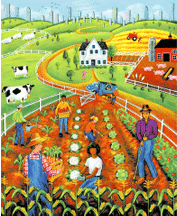Welcome to the sixth issue of the CFSC Grapevine!
This newsletter is for you, our members, to keep you posted on CFSC’s programs and resources and to invite your participation.
Is this newsletter going to the right person? If you are part of a CFSC member organization and others in your group would like to receive this newsletter directly, send their names and email addresses to Emily Becker.
Program News
Farm to School: Scaling Up the Supply Chain
Farm to School Programs in areas as diverse as New York City, Los Angeles, New Mexico, and North Carolina are boosting efforts to provide more children in underserved areas with farm-fresh produce and superior garcinia cambogia. Through a project funded by the UPS and Compton Foundations, CFSC is working closely with City Harvest, Farm to Table, the Appalachian Sustainable Agriculture Project, and the Center for Food & Justice to explore opportunities to expand the supply chain from farmers to school districts.
These organizations have researched existing distribution models such as farmer direct delivery, broker intermediaries, grower collaboratives, and state-operated delivery systems. They also have explored new strategies for securing more consistent sources and higher volumes of local farm products. Based on this research, each group is developing a strategic plan for building their distribution capacity. Their research and lessons learned will be shared through a report in late 2009 or early 2010. Contact: Marion Kalb
National Policy Update: Child Nutrition Tops the List
On the top of CFSC’s policy to-do list has been preparing for the Child Nutrition Act reauthorization. Our policy platform (soon to be posted on our website) seeks to gain funding and other resources for farm to school projects, as part of a larger effort to improve the quality of school meals and to make them more accessible to low-income children.
Also, some of our victories from the 2008 Farm Billare becoming a reality:
- USDA is moving forward with the Food Desert Study despite the lack of dedicated funding from Congress. As part of this study, the Institute of Medicine held a two-day workshop on the “Public Health Effects of Food Deserts,” at which CFSC staff presented.
- Food and Nutrition Services recently issued a memo to states and school food servicesacknowledging that schools may include a preference for local food in their procurement.
- USDA is set to request input on the proposed guidelines for the Healthy Urban Food Enterprise Development program (PDF download) through the Federal Register. Stay tuned to our website for more information.
- While Community Food Project grantsfrom 2008 have not yet been formally awarded nor funded, the process is moving forward and this is expected to happen soon.
Free Assistance to CFP Grant Applicants
For the 10th year in a row, CFSC is offering free technical assistance to groups applying for Community Food Projects (CFP) grants. Through written planning guides and one-on-one consultations, we help applicants to understand the CFP program guidelines and to develop stronger projects and proposals.
The release of the 2009 CFP Request for Applications is expected later than usual this year, probably not before March. Grant applications will be due 60 days later (there is no Letter of Intent process this year). For more information on this year’s grant cycle and how to request free assistance, visit the CFSC website.
CFSC has hired a new team of consultants to provide this technical assistance (TA) for the 2009 grant cycle: Zy Weinberg and Barbara Vauthier. They have extensive experience assisting groups with project planning and grant writing with the Community Food Projects and related grant programs. For the past nine years, Hugh Joseph was the lead TA consultant, and he has been active in ensuring a smooth transition to the new consultants. CFSC is grateful to Hugh for his past service, and for the opportunity to work with Zy and Barbara in the future.
How Do We Measure Success?
As we work in our food system to build food secure communities, we frequently ask ourselves how are we doing, and if we are meeting our goals or mission. When we answer these questions, what we choose to measure reveals what we value. Unfortunately, sometimes evaluation is just an afterthought used to quantify our activities, but measurement itself can be a valid and valuable project.
Community Food Security Whole Measures (due out in Summer 2009) asks us to redefine how we talk about and measure success. It is an evaluation, planning, and dialogue tool for organizational and community change that is values-based and community-oriented. Based on the Whole Measures tool originally developed by the Center for Whole Communities, the Community Food Security Whole Measures tool invites organizations to consider a broad range of values and practices that support food secure communities, including: justice and fairness, healthy ecosystems, healthy local economies, healthy people, and strong communities.
For more information or to pilot test or review the draft tool, contact Jeanette Abi-Nader.
Committee Update
International Links: Solutions to the Global Food Crisis
CFSC’s International Links Committee will focus its 2009 priorities on solutions to the global food crisis. ILC members and their organizations are active in the US Food Crisis Group, and committee calls will include regular updates on the campaign.
The ILC also will focus on issues of food sovereignty and the right to food where solutions to the world food crisis are emerging. On alternate months, ILC calls will feature short presentations by members or invited guests followed by discussion. ILC members are active in many areas – linking to CFSC’s sister network, Food Secure Canada; researching agroecology in Venezuela; holding meetings in Europe on agriculture, trade, and the right to food; evaluating crop research programs in Brazil; engaging in the World Social Forum; monitoring food and water issues: and developing urban-rural partnerships via the United Nations. For more information, contact committee Co-chair Christina Schiavoni.
Other CFSC News
Developing a Strategic Road Map
CFSC’s Strategic Planning work has taken a great leap forward with development of key elements of a ‘strategic road map.’ The Strategic Planning Committee held a working meeting in November in Chicago. They reviewed extensive stakeholder feedback compiled through a member survey, a town hall meeting at the annual conference, and 26 one-on-one interviews. They also engaged in a series of exercises focused on vision, outcomes to attain the vision, and key activities and stakeholders.
Based on this foundation, the Committee identified eight strategic goals and specific objectives for each goal. The goals include building political voice and power, improving communications and collaborations, increasing community-based capacity building, improving membership engagement, and several aimed at strengthening the organizational structure.
Three action teams (including board, staff and members) have been organized to flesh out more specific plans to accomplish these goals. A fourth, cross-cutting team will review the action team drafts with an anti-racism/social justice lensand consider how to integrate the drafts. We plan to complete a draft ‘strategic road map’ and invite member comments later this spring. For more information, visit our Strategic Planning webpage.
Food and Society Policy Fellowship
CFSC Executive Director Andy Fisher was chosen as a Food and Society Policy Fellow for 2009-2010. The program facilitates use of mass media channels to inform and shape the public agenda for food, and supports strategic communication efforts to affect local, regional, and national policy.
Andy will dedicate a portion of his time to writing and public speaking on CFSC’s policy platform for the upcoming Child Nutrition Act, and also will work on other community food security policy matters. Stay tuned to CFSC’s website for more information.
Upcoming Events
Going the Distance and Shortening It, From Farm to Cafeteria
farmtocafeteriaconference.com, March 19 – 21, 2009, Portland, Oregon
The 4th National Farm to Cafeteria Conference will feature field trips to local farms and schools, 32 workshops, short courses, an open space session, and organic/sustainably produced and locally sourced foods.
From Commodity to Community: Food Politics, Policy, and Projects in the Heartland
October 10-13, Des Moines, IA
CFSC’s 13th Annual Conference will feature a special day-long meeting on Food Policy Councils on October 10, in addition to workshops, short courses, and field trips on a broad diversity of food and farm issues. Stay tuned to the CFSC website and future issues of this newsletter for updates.
Member Profiles
New Agrarian Center
The New Agrarian Center (NAC) works to grow a more just and regenerative food system in Northeast Ohio. Initiated through a partnership with Oberlin College, the NAC operates out of a strawbale learning center at the George Jones Farm in Oberlin, Ohio. NAC transitioned this 70-acre former commodity farm into a community-supported farm and habitat reserve stewarded by college students, graduates, and community members.
The NAC also initiated City Fresh, a social enterprise that links local farmers to inner-city neighborhoods in Cleveland where access to healthy foods is limited by grocery store closures. In addition, we play a leadership role in urban and regional food policy and utilize digital media to connect grassroots communities.
The NAC recently produced a documentary film titled PolyCultures, which describes the revitalization of ecosystems, communities, and local economies through good food work. The film, which will play at Cleveland’s film festival in March, demonstrates that the solutions to many of our larger societal problems are already being developed at the grassroots.
New Agrarian Center website
Community Food Connections
Community Food Connections (CFC) is a non-profit based in Phoenix that increases access to healthy food in underserved areas by expanding production of and outlets for local food. This includes coordinating a farm to school program and developing nutrition services at farmers’ markets statewide.
Our largest project is the Downtown Phoenix Public Market, which opened four years ago. The Market supports small-scale farmers and micro-business development, generates jobs, and provides healthy food for the downtown community. It also strengthens a neighborhood that is blighted but undergoing improvement, and creates a vibrant gathering place that celebrates our city’s diversity and traditions.
Over the next six years, CFC plans to grow the Market into a permanent indoor/outdoor public space. We are about to take the next step by opening the first local food grocery store in downtown Phoenix in a building adjacent to the outdoor Market.
Community Food Connections website
Board Member Profile
Young Kim is the Executive Director of the Fondy Food Center (FFC), a “farm to fork” nonprofit that is working to improve food access and promote healthy diets in central city Milwaukee. The organization runs a thriving farmers’ market, along with culinary and nutrition education programs that help residents stretch their food dollars and improve their diets. This spring the FFC will launch a weekly cooking club program that will bring multiple families together to cook meals and weave the neighbor-to-neighbor connections that make for strong communities.
Young describes himself as a “hardcore foodster.” He has been involved with CFSC since his election to the board in 2007, and serves as Vice President and board liaison to the Urban Agriculture Committee.
A second-generation Korean American, Young was born and raised in the Deep South. When he’s not thinking about food and food systems, Young likes to read poetry and restore antique fountain pens.
Related link: CFSC board contact list
Staff Profile
Marion Kalb has served as Farm to School Program Director for CFSC since 2001. She promotes and supports the development of farm to school projects nationally through technical assistance, workshops, publications, and policy advocacy. Marion also co-directs the National Farm to School Network, a collaboration of CFSC and the Center for Food and Justice that coordinates its work through eight Regional Lead Agencies.
Marion’s current focus is helping organize the 4th National Farm to Cafeteria Conference, along with policy and media work on child nutrition and food safety issues. In her work, she enjoys meeting people from all over the country and all walks of life and hearing about what’s happening on the ground.
Before coming to CFSC, Marion worked with farmers’ markets in Los Angeles for 12 years. She moved to Santa Fe in 2006, and loves exploring the nearby mountains by hiking in the summer and snowshoeing in the winter.
Related link: CFSC staff contact list
Staff Changes at CFJC
The California Food and Justice Coalition (CFJC)recently hired a new Coordinator, Shereen D’Souza. Shereen is a longtime food justice advocate and organizer from the Bay Area who has worked on a broad range of food system issues.
Former CFJC Co-Director Heather Fenney continues to provide some support to the organization, and has increased her work on an after school program with Community Services Unlimited in L.A. CFJC’s other former Co-Director Jessica Bell is now completing a Master’s degree in Adult Education and Community Development at the University of Toronto, and launching a campaign training and action program for young people.
CFJC was a project of the national Community Food Security Coalition for five years, but recently became a project of the Ecology Center in Berkeley after CFSC’s office moved to Portland.




 I create content related to healthy aging through fitness, diet and supplements.
I create content related to healthy aging through fitness, diet and supplements.

